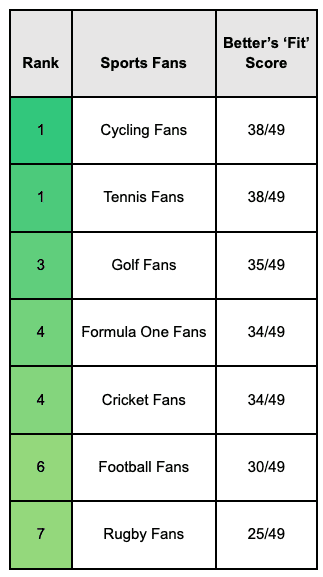Charitable social enterprise, Better, who operate 258 public sports and leisure facilities, asked 2,000 UK sports fans about their daily exercise regimes, participation in sports, sport-viewing habits, fruit and vegetable intake and their alcohol consumption, to determine which sports fans are hitting the treadmill and which ones prefer the comfort of their sofas when watching their favourite athletes compete.
Examining the seven most popular sports in the country, football, rugby, cricket, formula 1, golf, cycling and tennis, here’s how they ranked:

Tennis fans scored best in the “drinking” category, with just 7% saying they consume more than 10 units of alcohol each week, compared to cricket and rugby fans, who were found to be the biggest drinkers, with 12% of fans saying they drink 10 units or more weekly.
Impressively, third placed golfing fans gained top scores in both participation questions, as 76% said they play golf either sometimes or often, and 31% who said they watching sport in the gym or while exercising. However, they were let down by their overall daily exercise levels, with just 28% saying they achieve over 60 minutes of exercise each day. They were also one of the more inclined sporting fans to visit the pub to watch sport with their friends.
Formula One fans placed joint fourth, but were the most active of all the fans, with 34% achieving over 60 minutes of activity each day, while fellow fourth spot fans, cricket lovers, were the healthiest eaters, with 21% eating five or more fruit and vegetables every day.
Sixth place football fans were the most active, with 34% getting over 60 minutes of exercise every day, and were also found to be the least likely to drink more alcohol while watching sport (45%). However, they fell short in a number of other categories, including when it came to participation in football, with the lowest percentage (56%) of fans saying they play football on a regular basis.
Last-placed rugby fans were one of the worst in many categories. Along with football, they were the least likely to participate in their favourite sport themselves (56% play sometimes or often), they were the most likely to watch from the pub (45%), and were also one of the biggest drinkers.
In general however, the benefits of sport was clear to see across the board. 1 in 2 of all sports fans said it helps them socialise more with friends and family, and 49% said watching sport benefited their mental health. A further 35% said it makes them feel part of a community, and 33% said it inspires them to be more active – clear benefits that help fans live a happier and healthier life.
Phil Hannen, Health Intervention Manager at Better, commented on the findings:
“While our research explores how sports fans vary in their enthusiasm to emulate the sports stars they watch every week, the one thing clearly highlighted is how beneficial the presence of sports is in so many people’s lives.
“Coming out of difficult moments where sports events were cancelled, and so many were isolated in their homes, we can see from these results how essential the presence of sports has been, improving socialisation with friends, bettering mental health, and making fans feel part of a tight-knit community. It also encourages a large number of people to become more active themselves, and this is a huge aim of Better, to increase participation in sports and fitness across all ages and abilities.”
More information along with breakdowns of each result can be found on the Better website: https://www.better.org.uk/lp/healthiest-sports-fans-uk
Dr. Josephine Perry, sports psychologist at Performance in Mind https://performanceinmind.co.uk, spoke to Better about the results.
Cycling and tennis fans have been found as the most health-conscious sports fans in the UK, why do you think this?
Cycling and Tennis are sports that have additional enjoyment when you really understand the rules, history and idiosyncrasies so they are more likely to be watched by people who also partake in those sports. These fans will really understand how it feels to be sprinting for the line or trying to hit a forehand from someone serving incredibly fast and this will add to their enjoyment. And if you play Tennis or ride a bike you are usually doing a lot of training – many of the amateurs I work with in these sports will be doing around 8-10 hours of training a week.
In your experience, have you seen a correlation between avid sports fans and fitness levels/willingness to live a healthy lifestyle?
As you have found in your survey I think this really depends on the sport. Those who are passionate about cycling, athletics, and some of the sports that don’t get so much media time are likely to be competing in the sport itself so will be trying to maintain a healthy lifestyle in order to maintain or improve their performance. The sports with a larger number of fans will have some people who compete but many who watch for the social aspect and the brilliant feeling of belonging to a group, and so may not feel such a strong need to maintain a healthier lifestyle.
How could watching sports encourage people to live a healthier lifestyle?
Elite athletes could be considered the ultimate lifestyle influencers as so many of us would love to have the physical talent and mental fortitude to be able to play a sport at a high level. And some of us will get inspiration from that. But studies have found that it is often not the elites that inspire (because their abilities and achievements feel too far away from us) and instead it is those who are a bit like us (similar background, location, age or body shape) who we have seen work hard and improve that are most effective at encouraging us. This is known as vicarious confidence. A guy at the gym who has worked really hard and recently got a new 10k personal best will probably inspire us more than watching Mo Farah run yet another blistering race because we can see a bit of ourselves in the gym at the gym – Mo is too far removed from our lives.
How do good and bad results from sporting professionals impact their mood and does this transfer onto the fans? If so, how?
It is hard to predict an athlete’s response to a result: sometimes they can lose but be proud of the effort or skills they utilised. Other times they may do well but realise that was due to others’ mess ups rather than their own excellence. Fans however are more likely to have the obvious response to a win or a loss as they don’t have the wider insight or perspective. This transfers among fans quickly as when we are surrounded by others we can experience ’emotional contagion’ which is where the feelings of one person transfer over to another person. It begins as an unconscious mimicry (where we automatically copy another’s physical cues) and this then feeds back into our emotions. We share these emotions and fall into sync with others around us. When you are surrounded by people this can spread very quickly – so if you are watching sport live or in a pub the good results will feel extra positive, and the bad ones awful.
How does being actively involved in sports improve mental health and wellbeing?
Sport and exercise is brilliant for physical, mental and cognitive health. If it was a pill it would make billions! As well as the physical benefits the exercise we get through sport gives us structure, purpose, energy and motivation. It is also effective at altering the way we process and respond to our emotions, reduces how much we overthink and builds up an emotional resilience to stress. These help reduce symptoms of depression and anxiety, make us behave differently, boosts our self-esteem and means we reduce any feelings of loneliness by becoming more social.
When we get really involved in sport; competing ourselves, coaching, taking children along to competitions or joining supporters groups our identity starts to shape itself around that sport. This means we tend to think with this sporting identity and it can infiltrate into the way we make decisions and live our lives. If we only watch sport as a fan it is unlikely to be enough to influence our health and wellbeing – but really getting involved can give us the motivation we need to stay fit and healthy so we can do well in it and feel that amazing sense of progression.
Help keep news FREE for our readers
Supporting your local community newspaper/online news outlet is crucial now more than ever. If you believe in independent journalism, then consider making a valuable contribution by making a one-time or monthly donation. We operate in rural areas where providing unbiased news can be challenging. Read More About Supporting The West Wales Chronicle

























